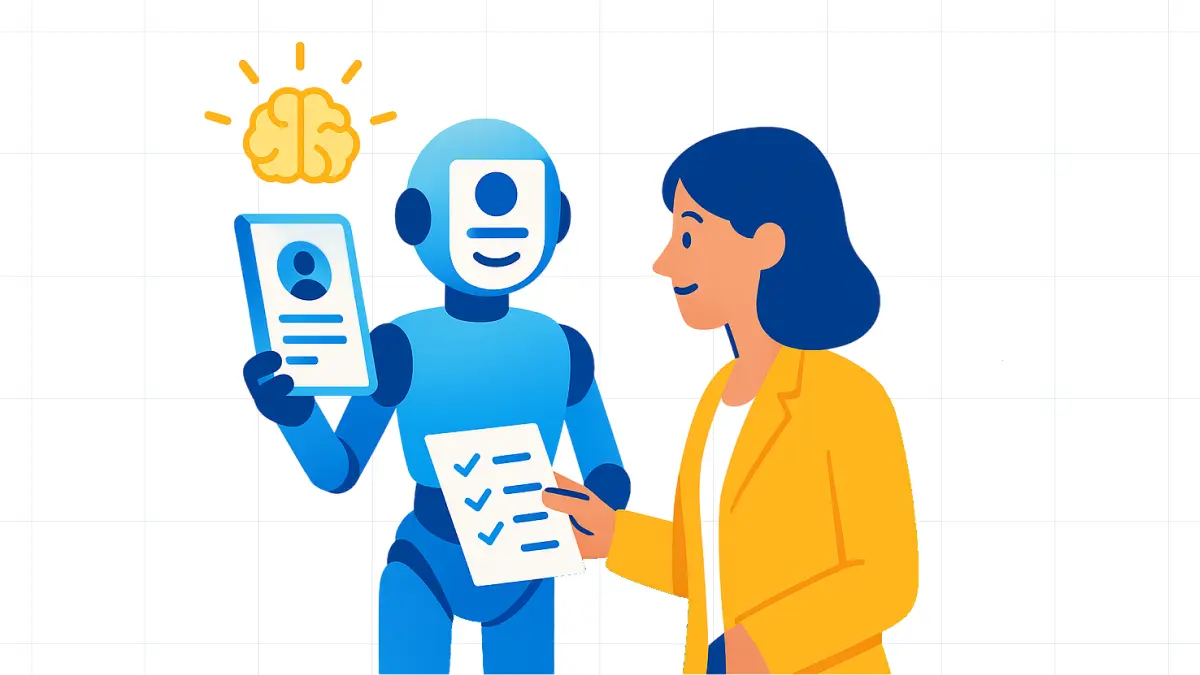How Autonomous AI Agents Will Reshape Hiring
You won’t just hire people in the future—you’ll hire agents to hire people. What does that mean for recruiters? You’ll want to read this.

As a Chief People Officer, I’ve sat through countless recruiting meetings where the air gets thick with frustration.
You know the ones - where business growth feels like it’s grinding to a halt because of a sea of open roles.
We're all looking at the same dashboard, seeing a list of unfilled positions and knowing that every day they remain open, our teams are stretched thin and our company's progress is stalled.
Recruiting is a tough, relentless business, and it’s a problem that often feels like it can’t be solved.
But what if the solution isn't about working harder, but about thinking differently?
Too many hours go into writing job posts, scanning resumes, and juggling schedules - tasks that burn out recruiters but don’t add value.
The fix isn’t just better software. It’s autonomous AI agents.
These aren’t chatbots or templates. They’re self-directed systems that take a recruiting task and get it done - sourcing, screening, scheduling - with little to no human input. They learn from feedback, improve over time, and work 24/7. And they’re already in motion.
Imagine this: You tell your AI agent, “Find me a data scientist with five years of Python experience,” and it says, “Got it.” Then it searches, filters, screens, and lines up interviews. That’s where we’re headed - and in some places, that’s already happening.
AI in HR Today
with Anthony Onesto
Subscribe for exclusive insights from Anthony Onesto, Chief People Officer at Suzy, and learn how AI is reshaping HR, enhancing employee engagement, and driving business success.
TOGETHER WITH
Why this matters now
Recruiters are under pressure to move faster and do more with fewer people. At the same time, the talent market is tighter than ever - especially in AI, where demand outpaces supply and job offers rival NBA contracts.
Offshoring can only go so far.
What companies need now are smarter systems - ones that can scale outreach, reduce noise, and free humans to focus on what they’re good at: relationships, judgment, strategy.
What makes AI agents different
Autonomous agents are built on two core strengths:
- Independence: Once you give them a prompt or task, they don’t just return suggestions. They act. That means recruiters aren’t stuck in reactive mode - they can step into a more strategic role.
- Learning: These systems get better with use. As they collect more outcomes and feedback, they refine their approach — which means faster, more accurate matches over time.
This is a shift from “automation” to “autonomy.” Instead of rules-based triggers, these agents operate more like junior team members: they learn, they adapt, and they work across platforms.
What this looks like in real life
OpenAI’s recent announcement of customizable AI agents points toward a near future where recruiting tasks can be fully handed off - not just delegated, but owned - by digital systems.
Companies like Sprouts AI (disclosure I advise them), Eightfold, SeekOut, and hireEZ are moving in this direction. They use AI to surface talent, suggest outreach, and improve decision-making. But with agents, the loop closes. The AI doesn’t just recommend - it acts.
We’re seeing early signals now, but the momentum is building. According to Deloitte’s 2024 Global Human Capital Trends report, 60% of HR leaders say they are exploring autonomous systems in some form - up from just 27% two years ago.
But it’s not all upside
Giving decision power to machines - especially in hiring — raises big questions. I talk about the current Workday legal challenges in this post.
Who’s accountable if a great candidate is overlooked?
What if the data the agent learns from is biased?
If systems are trained on past hiring decisions that favored certain profiles, they’ll repeat those patterns.
Bias in = bias out.
This is where human oversight becomes critical.
Autonomous systems need checks - not just on outcomes, but on inputs, logic, and fairness.
The best systems will make it easy to audit decisions, flag edge cases, and stay transparent with both candidates and hiring teams.
What it means for recruiters
This isn’t the end of recruiting. It’s a chance to refocus it.
Recruiters will stop spending time on tasks that don’t need a human brain.
Instead, they’ll move upstream - advising hiring managers, shaping employer brand, guiding DEI strategy, and helping candidates navigate the process.
In short: less admin, more impact.
It also changes how teams are built. With AI agents doing the legwork, even lean HR teams can scale faster.
In theory, a startup with one recruiter can scale to a degree, but while the software is autonomously finding talent, you will still need recruiters to close offers.
This shift won’t be instant, and it won’t be perfect. But it’s real.
Autonomous AI agents will reshape how we find and hire people. They will also work on behalf of the candidates too - “...have your AI call my AI.”
Used well, these tools can make hiring faster, more consistent, and more human - not less.
And that’s the future worth building.
AI in HR Today
with Anthony Onesto
Subscribe for exclusive insights from Anthony Onesto, Chief People Officer at Suzy, and learn how AI is reshaping HR, enhancing employee engagement, and driving business success.
